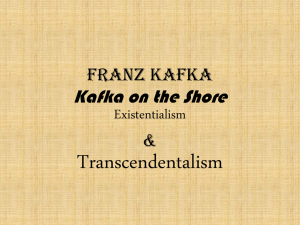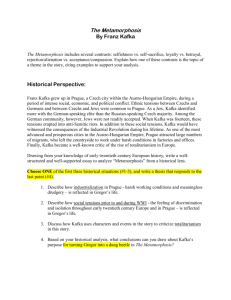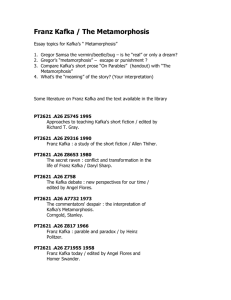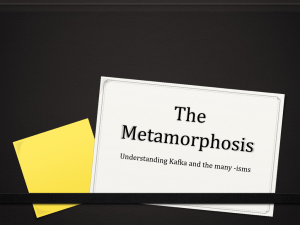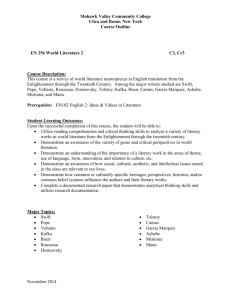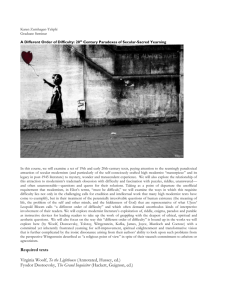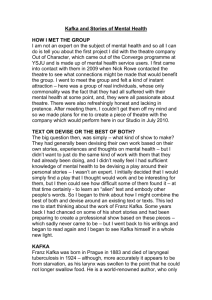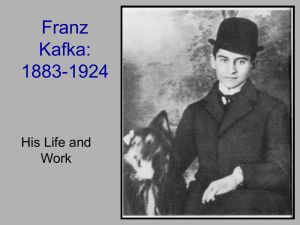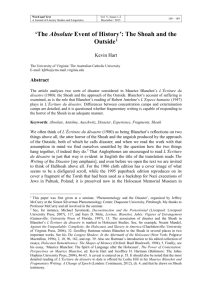Kafka and the Impossibility of Reading One`s Work
advertisement
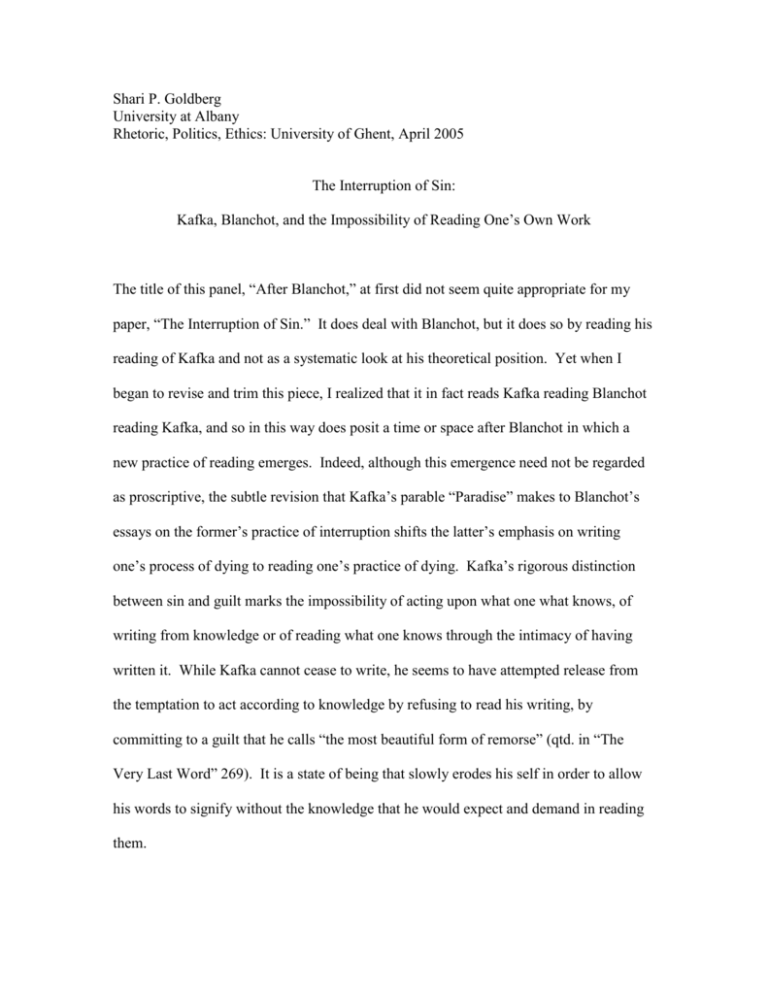
Shari P. Goldberg University at Albany Rhetoric, Politics, Ethics: University of Ghent, April 2005 The Interruption of Sin: Kafka, Blanchot, and the Impossibility of Reading One’s Own Work The title of this panel, “After Blanchot,” at first did not seem quite appropriate for my paper, “The Interruption of Sin.” It does deal with Blanchot, but it does so by reading his reading of Kafka and not as a systematic look at his theoretical position. Yet when I began to revise and trim this piece, I realized that it in fact reads Kafka reading Blanchot reading Kafka, and so in this way does posit a time or space after Blanchot in which a new practice of reading emerges. Indeed, although this emergence need not be regarded as proscriptive, the subtle revision that Kafka’s parable “Paradise” makes to Blanchot’s essays on the former’s practice of interruption shifts the latter’s emphasis on writing one’s process of dying to reading one’s practice of dying. Kafka’s rigorous distinction between sin and guilt marks the impossibility of acting upon what one what knows, of writing from knowledge or of reading what one knows through the intimacy of having written it. While Kafka cannot cease to write, he seems to have attempted release from the temptation to act according to knowledge by refusing to read his writing, by committing to a guilt that he calls “the most beautiful form of remorse” (qtd. in “The Very Last Word” 269). It is a state of being that slowly erodes his self in order to allow his words to signify without the knowledge that he would expect and demand in reading them. Goldberg 2 I’ll begin my analysis by sketching how Kafka’s narration of the post-lapsarian state posits us as bound, forever tempted, in sin but without recourse to a self-redeeming guilt. The parable situates the Fall from Eden as a draw, of sorts, between God and the serpent, both of whose promises as to the consequence of eating of the Tree of Knowledge were partially fulfilled, which is to say, partially thwarted, at man’s expense: According to God, the instantaneous result of eating of the Tree of Knowledge would be death; according to the serpent (at least it can be understood so), it would be equality with God. Both were wrong in similar ways. Men did not die, but became mortal; they did not become like God, but received the indispensable capacity to become so. Both were right in similar ways. Man did not die, but the paradisiacal man did; men did not become God, but divine knowledge. (“Paradise”169) This compromise, in which man knows divinely but does not possess a corresponding immortality that would permit the fulfillment of the knowledge, is a limitation of continuous capacity that excludes attainability. Further, remaining in this state of capacity is for Kafka the very quality of sinfulness: sin is not an event to be overcome or repented but this “state in which we find ourselves” (169), the state of being torn, or in his metaphor, “fettered” between God’s domain of knowledge and the serpent’s domain of death (169). The opposition is always underlined by temptation itself, which, if born in Eden, certainly did not die with the expulsion. Kafka writes: [N]obody can remain content with the mere knowledge of good and evil in itself but must endeavor as well to act in accordance with it. The strength to do so, however, is not likewise given him, consequently he must destroy himself trying to do so, at the risk of not achieving the necessary strength even then; yet there remains nothing for him but this final attempt. (170) Man’s knowledge is thus opposed to his life because he acts toward what he knows, which is yet what he cannot attain: divinity, perfection. The unattainable continues to tempt, even as the attempt to act brings about death. Striving towards an always-already- Goldberg 3 thwarted goal, man slowly kills the “endeavor” in himself that defines life after the Fall. Hence, as in the bible story, temptation exists at the crossroads between death and knowledge, promising an escape to and from both. The full implication of the fettering, then, is the restlessness that accompanies it: the restlessness of incomplete-able knowledge that must strive toward death. God and the serpent were both right, and both wrong: there is divine knowledge, but only as it approaches death; there is death, but we find our pathway to it through knowledge. For Kafka, this is what it means to live in sin—which is to say, to live at all; which is to say, to sin. It hardly needs to be said that Kafka’s reading is a frustrating one. Indeed, he posits the frustration as so exasperating that it leads man to deny his state: “he actually refuses to account for the deadlock by an error in the original fettering” (170). Leaving aside the implications of the fettering as both “error” and “original” for now, I wish to point to the form that this refusal takes: man is filled with fear; he prefers to annul his knowledge of good and evil (the term, “the fall of man,” may be traced back to that fear); yet the accomplished cannot be annulled, but only confused. It was for this purpose that our rationalizations were created. The whole world is full of them, indeed the whole visible world is perhaps nothing more than the rationalization of a man who wants to find peace for a moment. An attempt to falsify the actuality of knowledge, to regard knowledge as a goal still to be reached. (170) In an attempt to evade the fetter, or to have the fetters pull in opposite directions as little as possible, man attempts to deny the fetter of knowledge so that his actions will not strive to accord with it. If man pretends not to know, reasons Kafka, his action will not be countered with a tug from the impossibility of its correlation with knowledge. But of course, pretending and rationalizing do not result in peace; rather, they are the shadows, Goldberg 4 or perhaps the mirror images, of temptation and impossibility. Imagining “the fall of man,” the occasion of knowing, as a falling rather than a rising in no way excuses the responsibility that is inherent in knowing and manifested as the endeavor to act with knowledge. If our sinful state is one of ultimate culpability, however, Kafka maintains that it exists “quite independent of guilt.” Thus being responsible for one’s knowledge is an effect of sin, but not, as Freud would have it, guilt. Guilt must be something else, not the corollary to a prohibited action but its inverse: if sin is the state of knowing without being able to act, guilt is the state of having acted without knowing. The stakes are high for such a definition, for it posits Adam’s decisive act as originarily guilty rather than originarily sinful. But, in Kafka’s reading, isn’t this necessarily the case? In Freud’s conception of guilt in Civilization and its Discontents, the ego acts with temporary disregard for the superego, which later imposes guilt for the former’s aggressive action: “an instinctional need acquires the strength to achieve satisfaction in spite of the conscience,” and is followed by the guiltiness of that very conscience (132). The subject’s guilt thus comes from knowing and avoiding knowledge. Yet for Kafka, once Adam knows, he becomes sinful and not guilty. It is the decisive gesture, made in order to know, that inaugurates his guilt. Indeed, as Cixous suggests, Freudian guilt is for Kafka rationalization, a reaction to being before the law, as it were, rather than preceding it (“Writing and the Law” 25). Again, Kafka writes that rationalization, the attempt to annul the knowledge of good and evil is “an attempt to falsify the actuality of knowledge, Goldberg 5 to regard knowledge as a goal still to be reached” (“Paradise” 170). Rationalization prefers guiltiness to the sinful state, but man will never succeed in repeating Adam’s fundamental guilt. We have knowledge, and we can never again exist without knowing the difference between good and evil. Still, insofar as “the expulsion from Paradise is in its main significance eternal,” insofar as the event is “eternal[ly] recapitulated,” we might be said to have always just discovered that difference (168). We sin when we do not act appropriately; but even when we do not act at all, the shadow of a guilt from the paradisiacal moment of not knowing still haunts us. Guilt is not an expression of having known better, but of having not known, and knowing now. But what does this reading do to Kafka’s claim in a letter quoted by Blanchot that, “I have a feeling of guilt only because for my being it is the most beautiful form of remorse” (“The Very Last Word” 269)? Does Kafka imagine his being as somehow comparable to Adam’s, capable of a similarly pure guilt, not simply “the exigency to go backward,” as he states in the letter, but the actual procedure of a certain backwardness or the erasure of knowledge? I understand Blanchot to assert that Kafka’s central problem—in regards to his writing as well as his relationships—is precisely that of his being, and of his knowledge of that being, his intimacy with a self that remains alienated from language but struggles to express itself precisely when confronted with the difference of language or of another being. In other words, not only can Kafka not act upon that which he knows in writing, he knows this, and cannot act upon it by not writing. His sinful state is, as Blanchot writes, not only his situation, in which “Writing destroys life, protects life, demands life, is ignorant of life, and vice versa. In the end Goldberg 6 writing has no relation to life” but the fact that Kafka knows this, that he “is made aware of [the fact that writing never refers to itself in the absence of relation, but to what is other than it]” (272). Kafka desperately wishes to write what he knows of himself to Felice, but his words refuse to complete his knowledge and insist on operating separately, as words, which from the first moment of reading are always inadequate, incomplete. What Kafka wants is not for language to operate transparently, but for it to admit the possibility of, in Blanchot’s words, “show[ing] himself” (273): to be able to do away with the comparison of knowing himself and reading his inadequacy of expression. The desire to show something, in Blanchot’s terms, is the desire for an utter passivity in which the thing, not one’s vision or knowledge or possession of thing, becomes manifest in language. As he writes in The Infinite Conversation, I am seeking a way, without getting there, to say that there is a speech in which things, not showing themselves, do not hide... A speech such that to speak would no longer be to unveil with light. Which does not imply that we would want to go in search of the joy, or the horror, of the absence of the day: just the contrary; we would want to arrive at a mode of ‘manifestation,’ but a manifestation that would not be one of unveiling-veiling. (29) Drawing from Heidegger’s notion of Saying, Blanchot’s showing is most obviously problematic when the thing that is to stand for itself is the writer himself, when that which is to be manifested without the appropriating knowledge of the speaker is precisely the appropriating knowledge of the speaker. How can Kafka get himself out of the way of his writing? He is tortured, as Blanchot writes, by this proposition: “How to unveil himself in such a way as to be seen as he searches for himself through invisibility which is outside of all veiling and unveiling?” (“The Very Last Word” 273). To unveil oneself outside of all veiling and unveiling is to divorce oneself from the temptation of Goldberg 7 completing knowledge with action; it is not needing to know what it is that one writes. And in not knowing, it is to be released from the fetters of the sinful state by a serious guilt. I want to suggest that Kafka finds this guilty out in the space of reading, or not reading. Blanchot describes Kafka as seeking a continuous, uninterrupted space of writing—the closure of temptation—but subsequently realizing that such an absolute of writing is an abysmal absence, a non-continuity. Thus Kafka does not succeed in completing what “Paradise” claims cannot be completed: the act of writing uninterrupted by its motivation, knowledge translated to word. But he does find that he can work towards a refusal of its central temptation: to cease to find himself drawn to completion; to rest in giving up his knowledge in exchange for death, to attempt to sacrifice the knowing self for the unknowing words that are the evidence of his absence, of his dying. What Kafka discovers, in Blanchot’s words, is not “the uninterrupted in its becoming, but the becoming of interruption” (281). Kafka’s passive acceptance of interruption, however, still does not modify how he writes so much as how he responds to what he has written. “All of his unfinished works,” writes Blanchot, put in some sense before his eyes...this new way of completing themselves in and by interruption. However, unable to be anything but blind to what could be read there, unable to reach it except through an exigency that he came up against in order to destroy himself and not confirm himself in it, he had to agree to see the power to read taken away from him. (281) Goldberg 8 The change in Kafka’s writing comes, it would seem, not through the works themselves, nor through the process of writing them, but through Kafka’s attitude in regarding them: his unfinished works—written if not completed—complete themselves when Kafka refuses to read them. In a final acknowledgement of his sinful need to see through writing what should be unveiled, manifested, outside of all veiling and unveiling, he agrees to watch himself abandon that writing. That is to say, he cannot help but move to write himself, his thoughts, as he says, “what had been premeditated” (280). But in fully accepting this state of sin, he realizes that he need not demand the accord of that self and the writing it engenders. For the writing to remain outside, it must no longer be his; it must no longer be uninterrupted. He thus renounces his knowledge of his texts, his words as his words, to attempt to let the texts manifest or complete themselves. Kafka “see[s] the power to read taken away from him,” taking with it the knowledge with which he would have read: his knowledge of self—which is to leave him finally, beautifully, guilty. Kafka’s final move towards passivity here comes after the fact of writing, almost literally outside of it, insofar as he chooses to remain divorced from the space of his work, unfettered to it. He no longer knows what he has written; he does not use his knowledge to read and his work remains outside of that which he continues to attempt to write. Thus Blanchot finds him “unaware” not only of his writing but of the profoundly guilty action that continues to turn him away from it. Blanchot writes that Kafka was, “unaware that the books he believed not to have written and that, from that point on, he intended for definitive destruction, had received the idea of being almost freed from themselves and, Goldberg 9 [that] by erasing all idea of a master piece and all idea of a work, [they could identify] themselves with the absence of book” (281). What Kafka achieves here cannot even be attributed to the active subject of Kafka, for he must be unaware in order to let his book manifest itself not as the known quantity of masterpiece or work but with the abandonment that he passively bestows upon them in his act of abandonment, in his becoming of interruption. The book of absence that he did not think he could write is manifested in his absenting himself from its existence. There is, then, an almost perfect symmetry in which Kafka seems to have succeeded in writing himself. Yet that such completion only happens in Kafka’s absence, when he is passive, in the process of dying, refuses any such neatness. For I have tried to open a space in which Kafka’s impossibility remains Kafka’s impossibility; if he recognizes the selfish and yet ethical imperative not to see himself written, he does not absolve himself of the selfish yet ethical imperative to write. Similarly, Blanchot’s work towards reading Kafka as he read himself, towards seeing Kafka show himself, does not ultimately arrive. His movement towards reading as the decisive act of writing, however, does complicate the process through which we simultaneously sin and die, lose ourselves dying in our writing, for perhaps what we ethically strive for is not death or product, but a guilt through which our words are released from veiling and unveiling, from prohibition and knowledge, in favor of a writing manifested and, if teetering, scintillating, as yet unfallen. Goldberg 10 Works Cited Blanchot, Maurice. “Seeing is Not Speaking.” The Infinite Conversation. Trans. Susan Hanson. Minneapolis: University of Minnesota Press, 1993. 25-32. ----. “The Very Last Word.” Friendship. Trans. Elizabeth Rottenberg. Stanford: Stanford University Press, 1997. 265-288. Cixous, Helene. “Writing and the Law: Blanchot, Joyce, Kafka, and Lispector.” Readings: The Poetics of Blanchot, Joyce, Kafka, Kleist, Lispector and Tsvetayeva. Ed. and trans. Verena Andermatt Conley. Minneapolis: University of Minnesota Press, 1991. 1-27. Freud, Sigmund. Civilization and its Discontents. The Standard Edition of the Complete Psychological Works of Sigmund Freud. Trans. James Strachey. Toronto: The Hogarth Press Ltd, 1961. 64-148. Kafka, Franz. “Paradise.” The Basic Kafka. New York: Washington Square Books, 1979. 168-170.
